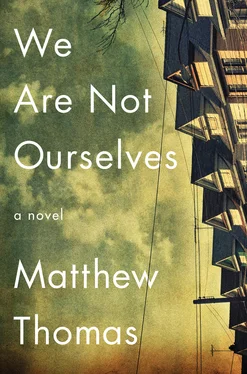Eileen was so excited to get a baby brother or sister that she physically felt her heart breaking when her father told her that her mother had miscarried. When a dilation and curettage didn’t stop the bleeding, the doctors gave her a hysterectomy.
After the hysterectomy, her mother developed a bladder infection that nearly killed her. She stayed in the hospital on sulfa drugs while it drained. Children weren’t encouraged to visit the sick, so Eileen saw her mother less than once a month. Her father rarely spoke of her mother during this period that stretched into a handful of months, then half a year and beyond. When he intended to bring Eileen to see her, he would say something vague like, “We’re going, get yourself ready.” Otherwise, it was as if she’d been erased from their lives.
It didn’t take long for Eileen to figure out that she wasn’t supposed to mention her mother, but one night, a couple of weeks into the new order, she brought her up a few times in quick succession anyway, just to see how her father would react. “That’s enough now,” he snapped, rising from the table, evidence of suppressed emotion on his face. “Clean up these dishes.” He left the room, as though it were too painful for him to remain where his absent wife had been invoked. And yet they spent so much time fighting. Eileen decided she would never understand the relations between men and women.
She was left to handle the cooking and cleaning. Her father set aside money for her to shop and go to the Laundromat. She rode her bike to one of the last remaining farms in the neighborhood to buy fresh vegetables, and she developed her own little repertory of dishes by replicating what she’d seen her mother make: beef stew with carrots and green beans; London broil; soda bread; lamb chops and baked potatoes. She took a cookbook out of the library and started ranging afield. She made lasagna just once, beating her fist on the countertop when it turned out soupy after all that work.
After doing her homework by the muted light of the end table lamp, she sat on the floor, building towers of playing cards, or went upstairs to the Schmidts’ to watch television and marvel over the mothers who never stopped smiling and the fathers who folded the newspaper down to talk to their children.
At school she usually had the answer worked out before the other girls put up their hands, but the last thing she wanted was to draw any kind of attention to herself. She would have chosen, of all powers, the power to be invisible.
• • •
One day, her father took her to Jackson Heights, stopping at a huge cooperative apartment complex that spanned the width of a block and most of its length. They descended into the basement apartment of the super, one of her father’s friends. From the kitchen she looked up at the ground level through a set of steel bars. There was grass out there, blindingly green grass. She asked to go outside. “Only as long as you don’t step foot on that grass,” her father’s friend said. “Not even the people who live here are allowed on it. They pay me good money to make sure it stays useless.” He and her father shared a laugh she didn’t understand.
A frame of connected buildings enclosed a massive lawn girdled by a short wrought-iron railing. Nothing would have been easier than clearing that little fence. Around the lawn and through its middle ran a handsome brick path. She walked the routes of the two smaller rectangles and the outer, larger one, wending her way through all the permutations, listening to the chirping of the birds in the trees and the rustling of the leaves in the wind. Gas lamps stood like guardians of the prosperity they would light when evening came. She felt an amazing peace. There were no cars rushing around, no people pushing shopping carts home. One old lady waved to her before disappearing inside. Eileen would have been content to live out there, looking up into the curtain-fringed windows. She didn’t need to set foot on that grass. Maybe someone would bring her upstairs and she could look down on the whole lawn at once. The lights were on in the dining room of one apartment on the second floor, and she stopped to stare into it. A grandfather clock and a beautiful wall unit gazed down benignly at a bowl on the table. She couldn’t see what was in the bowl, but she knew it was her favorite fruit.
The people who lived in this building had figured out something important about life, and she’d stumbled upon their secret. There were places, she now saw, that contained more happiness than ordinary places did. Unless you knew that such places existed, you might be content to stay where you were. She imagined more places like this, hidden behind walls or stands of trees, places where people kept their secrets to themselves.
• • •
When the soles of her shoes wore through, her father, in his infinite ignorance of all things feminine, brought home a new, manure-brown pair Eileen was sure were meant for boys. When she refused to wear them, her father confiscated her old pair so she had no choice, and when she complained the next night that the other girls had laughed at her, he said, “They cover your feet and keep you warm.” At her age, he told her, he had been grateful to get secondhand shoes, let alone new ones.
“If my mother were well,” she said bitterly, “she wouldn’t make me wear them.”
“Yes, but she’s not well. And she’s not here.”
The quaver in his throat frightened her enough that she didn’t argue. The following night, he brought home a perfectly dainty, gleaming, pearlescent pair.
“Let that be an end to it,” he said.
• • •
Mr. Kehoe came home late, but he never seemed drunk. He was unfailingly polite. Despite the fact that he’d been there since she was two years old, it always felt to Eileen as if he’d just moved in.
She took to cooking extra for him and bringing a plate to his room. He answered her knock with a smile and received the offering gratefully. Her father grumbled about charging a board fee.
Mr. Kehoe had a smear of black in a full head of otherwise gray hair. It looked as if he’d been streaked by a tar brush. When he wasn’t wearing his tweed jacket with the worn cuffs, he rolled his shirt sleeves and kept his tie a little loose.
He started battling through fitful bouts of coughing. One night, she went to his door with some tea; another, she brought him cough syrup.
“It’s just that I don’t get enough air,” Mr. Kehoe said. “I’ll take some long walks.”
Even through severe coughing fits he managed to play the clarinet. She’d stopped trying to hide her efforts to listen to it. She sat on the floor beside his door, with her back to the wall, reading her schoolbooks. In the lonely evenings she felt no need to apologize for her interest. Sometimes she even whistled along.
One night, her father sat quietly on the couch after dinner with a troubled look on his face. Eileen avoided him, occupying her usual spot by Mr. Kehoe’s door. Heat rattling through the pipes joined the clarinet in a kind of musical harmony. She looked up and was unnerved to find her father looking back at her, which he never did. She concentrated on her beautifully illustrated copy of Grimm’s Fairy Tales . The day before, when she’d told him that Mr. Kehoe had given it to her, her father had grown upset. She’d seen him knock on Mr. Kehoe’s door a little while later and hand him some money.
She was absorbed in “The Story of the Youth Who Went Forth to Learn What Fear Was” when her father startled her away from the door. She barely had time to step aside before he had thrown Mr. Kehoe’s door open and told him to quit making that racket. Mr. Kehoe apologized for causing a disturbance, but Eileen knew there had been none; you could barely hear him playing from where her father had been sitting.
Читать дальше
Конец ознакомительного отрывка
Купить книгу












